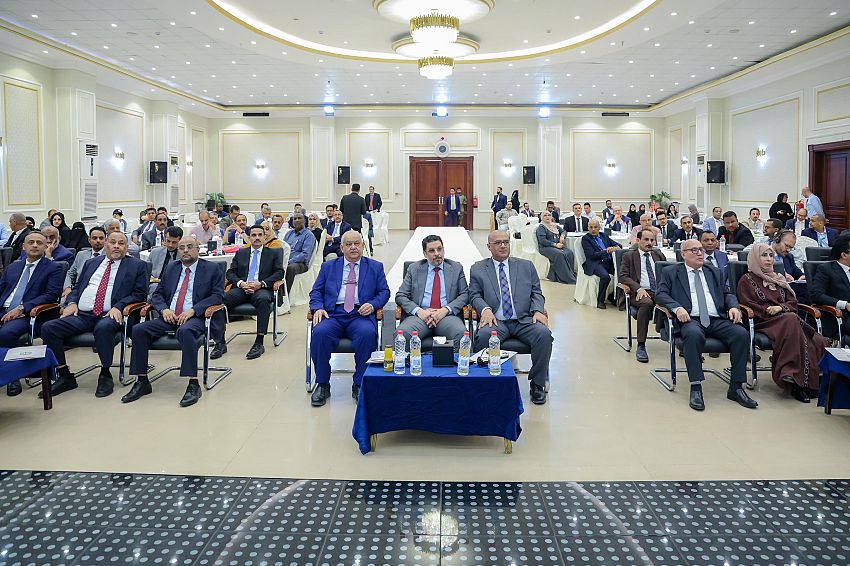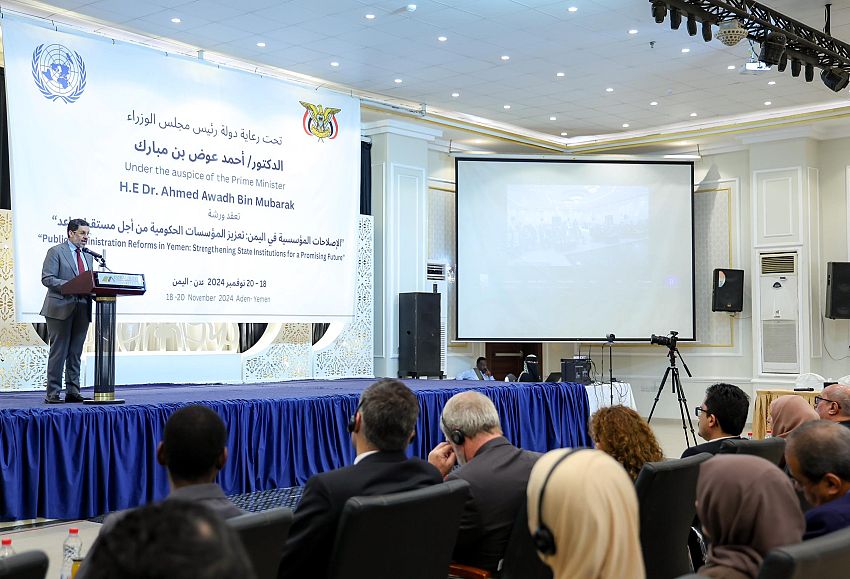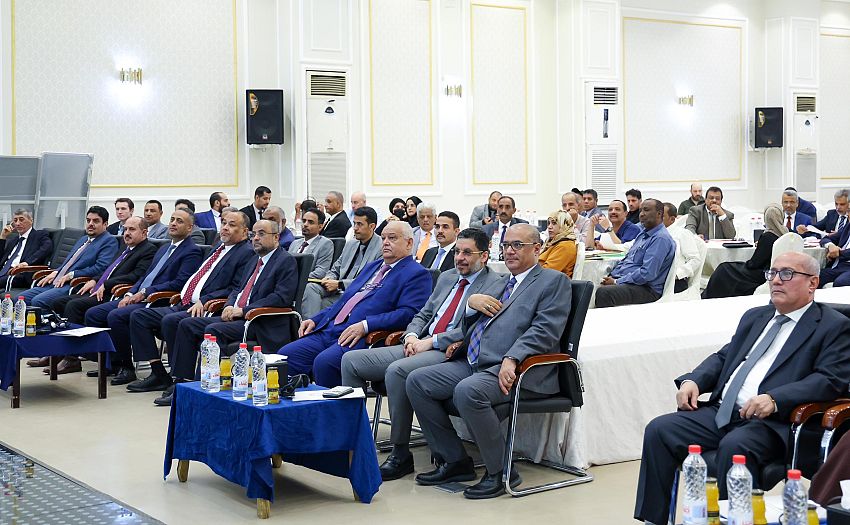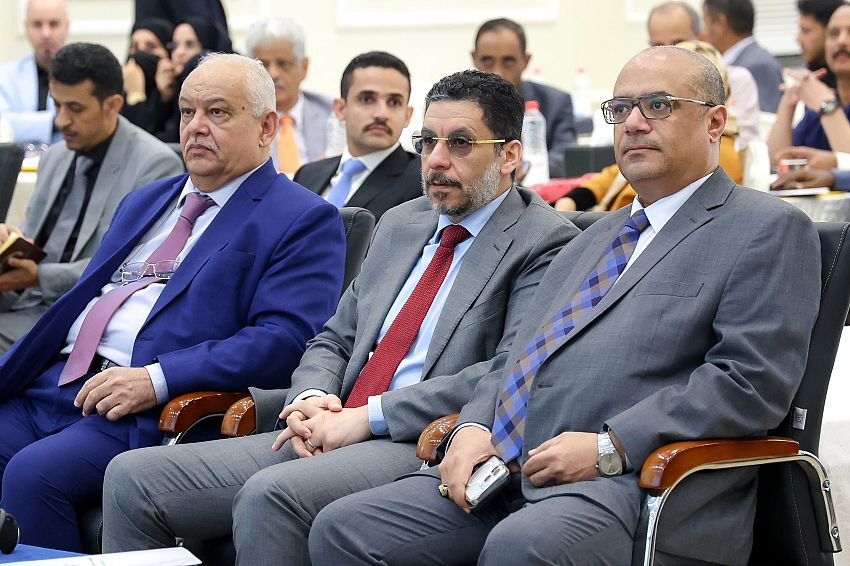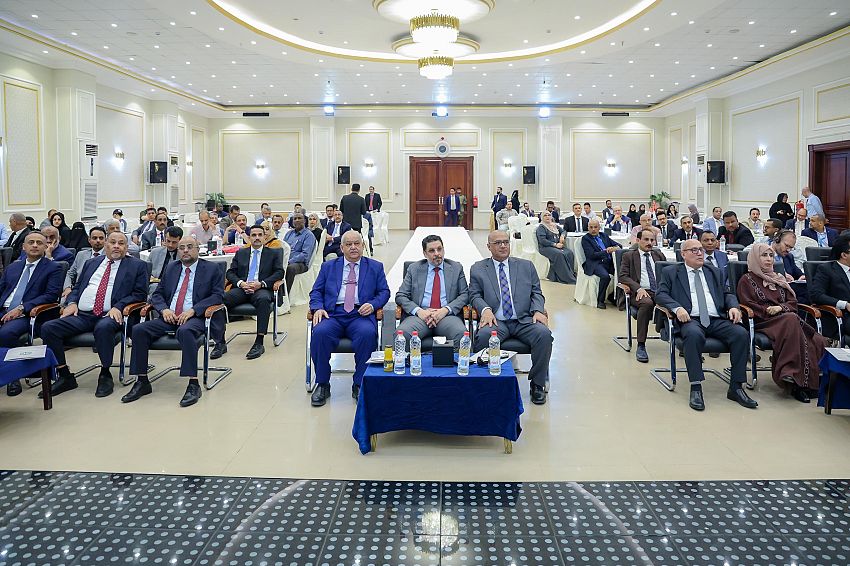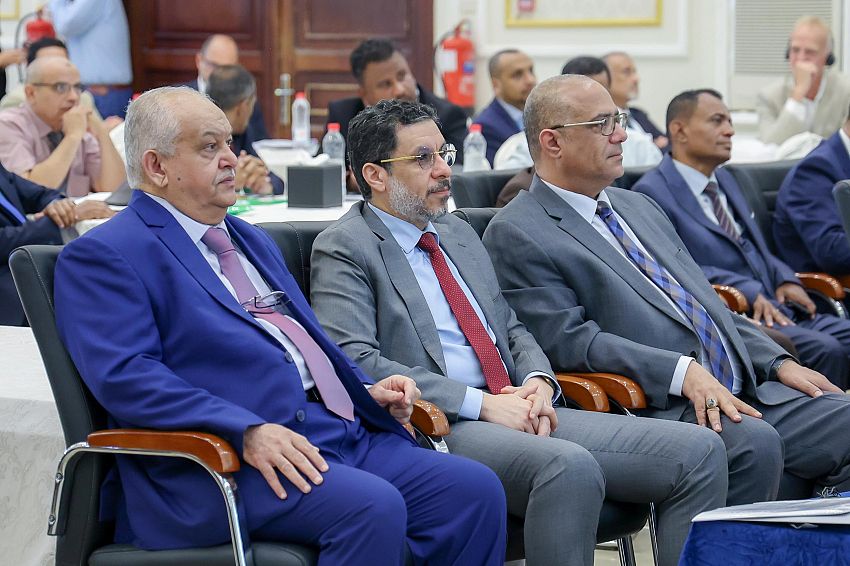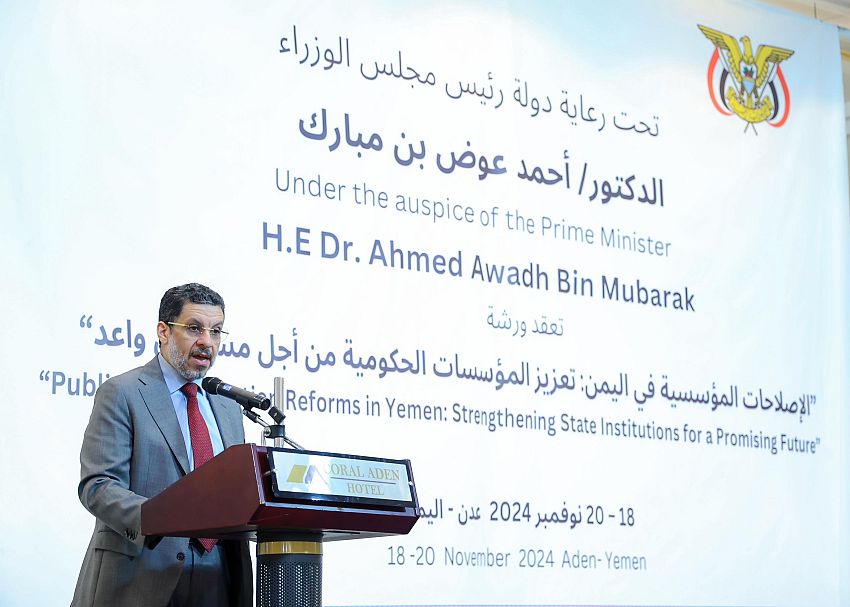
الحملة الأمنية تضبط قارب تهريب قبالة باب المندب قادم من ميناء بندر عباس الإيراني
ضبطت الحملة الأمنية، التابعة لقوات العمالقة، يوم أمس، قبالة مضيق باب المندب، قارب تهريب قادم من ميناء بندر عباس الإيراني، وعلى متنه شحنة مكونة من 3،000 كرتون من الأدوية غير مصرح دخولها.

مجلس الوزراء السعودي: المملكة ستتّخذ جميع الإجراءات للذود عن أمنها وحماية أراضيها والمواطنين والمقيمين
أكد مجلس الوزراء السعودي، أن المملكة العربية السعودية، ستتّخذ جميع الإجراءات اللازمة للذود عن أمنها وحماية أراضيها والمواطنين والمقيمين.
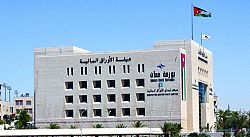
بورصة عمان تغلق على ارتفاع بنسبة 0.54 بالمائة
اغلقت بورصة عمان، اليوم الثلاثاء، تداولاتها على ارتفاع بنسبة 0.54 بالمائة عند مستوى 3572 نقطة.

أرسنال يعزز صدارته للدوري الإنجليزي بفوزه على تشيلسي بهدفين
عزز نادي أرسنال صدارته للدوري الإنجليزي الممتاز لكرة القدم بفوزه على غريمه تشيلسي بهدفين مقابل هدف في المباراة التي جمعتهما، اليوم الأحد، ضمن منافسات الجولة الـ29 من المسابقة.
آخر تحديث: ،
2026/03/04
الساعة
08:09:14
آخر الأخبار:
 محافظ عدن يطّلع على برنامج المعرض الوطني للبن والتمر بعدن
محافظ عدن يطّلع على برنامج المعرض الوطني للبن والتمر بعدن
 وزير التربية يتفقد المطبعة السرية ويطلع على استعدادات الامتحانات الوزارية
وزير التربية يتفقد المطبعة السرية ويطلع على استعدادات الامتحانات الوزارية
 هيئة الأدوية تنظيم تقيم أمسية رمضانية لكوادرها
هيئة الأدوية تنظيم تقيم أمسية رمضانية لكوادرها
 انطلاق فعاليات يوم اللغة السقطرية بدعم البرنامج السعودي لتنمية وإعمار اليمن
انطلاق فعاليات يوم اللغة السقطرية بدعم البرنامج السعودي لتنمية وإعمار اليمن
 وزير الشؤون الاجتماعية يبحث مع الممثل المقيم لصندوق الأمم المتحدة للسكان تعزيز التعاون الإنساني
وزير الشؤون الاجتماعية يبحث مع الممثل المقيم لصندوق الأمم المتحدة للسكان تعزيز التعاون الإنساني
آخر الأخبار:
 محافظ عدن يطّلع على برنامج المعرض الوطني للبن والتمر بعدن
محافظ عدن يطّلع على برنامج المعرض الوطني للبن والتمر بعدن
 وزير التربية يتفقد المطبعة السرية ويطلع على استعدادات الامتحانات الوزارية
وزير التربية يتفقد المطبعة السرية ويطلع على استعدادات الامتحانات الوزارية
 هيئة الأدوية تنظيم تقيم أمسية رمضانية لكوادرها
هيئة الأدوية تنظيم تقيم أمسية رمضانية لكوادرها
 انطلاق فعاليات يوم اللغة السقطرية بدعم البرنامج السعودي لتنمية وإعمار اليمن
انطلاق فعاليات يوم اللغة السقطرية بدعم البرنامج السعودي لتنمية وإعمار اليمن
 وزير الشؤون الاجتماعية يبحث مع الممثل المقيم لصندوق الأمم المتحدة للسكان تعزيز التعاون الإنساني
وزير الشؤون الاجتماعية يبحث مع الممثل المقيم لصندوق الأمم المتحدة للسكان تعزيز التعاون الإنساني
Prime Minister launches national workshop on institutional reforms in Yemen
[18/11/2024 05:43]
ADEN - SABA
Prime Minister Dr. Ahmed Awadh bin Mubarak inaugurated on Monday a national workshop focused on institutional reforms in Yemen: Strengthening State Institutions for a Promising Future.
The workshop, organized by the Prime Ministry in coordination with the Ministry of Civil Service and Insurance, and supported by the United Nations Development Program, will take place over three days.
Its goal is to create a collaborative platform to support the government in its efforts to enhance public administration and build institutions by assessing the current state of government entities, identifying key obstacles to their renewal, and outlining necessary steps for their reform and strengthening.
In his opening speech, Prime Minister emphasized that this is the first workshop organized by the Yemeni government since the disastrous Houthi coup, aimed at achieving several objectives, including directing donor activity and international organizations toward vital sectors that will make a significant difference in Yemen.
“I want to stress that we are not starting from scratch; we are mindful of the previous efforts made in this area and the government’s commitments in financial and administrative reform, particularly its commitments to the Arab Monetary Fund,” he said.
The Prime Minister confirmed that this workshop is part of implementing five pathways that are primary priorities for the government, aiming to rectify many distortions and change the current reality of institutions, transforming them into entities that achieve efficiency and capability in performance based on the principles of good governance, transparency, accountability, the rule of law, justice, and equality.
Bin Mubarak pointed out that the workshop highlights one of the major issues facing the government: the status of the pension fund, which serves as a fundamental umbrella for social protection for a wide segment of society—the retirees who have dedicated a significant part of their lives to serving the nation and deserve to be a priority for the government.
He stated: "However, we place this within a vision for comprehensive administrative reform that begins with overhauling the pension system and transforming it into a successful investment fund with the freedom to invest its resources in vital and secure investment projects, contributing to the country’s development while ensuring the rights of the insured and providing them with social protection and a decent life."
The Prime Minister revealed that in some institutions, the percentage of those reaching retirement age has reached 80%. Due to difficult living conditions and an inability to meet pension salary obligations, employees eligible for retirement have been forced to remain in their positions, leading to compounded administrative and financial problems that hinder the renewal and rejuvenation of government institutions, thereby weakening state institutions and limiting their efficiency and performance.
This situation has also deprived institutions of benefiting from the energy of youth, who are our hope for a better future. One of our goals is to empower youth in government institutions.
He clarified that the objective of reforming the pension system is not only to enhance social protection but also to initiate a comprehensive reform process within state institutions.
The Prime Minister announced a comprehensive reform process in five key areas: restructuring institutions, reforming wages and salaries, improving employment policy, building capacities, and advancing digitization.
He emphasized that these reforms are not mere aspirations but necessary steps to ensure the sustainability of our institutions and fulfill the aspirations of the Yemeni people in building a strong, cohesive, and just state.
Regarding the first area of restructuring institutions, Dr. Ahmed Awadh bin Mubarak explained that many institutions operate with traditional, replicated structures that do not fit their assigned tasks.
He directed the restructuring of the Prime Minister's Office and the General Secretariat of the Council of Ministers as a first step toward transforming the Prime Minister's Office into a center of excellence that serves as a model for government performance.
He noted that as part of wage and salary reform, a new system will be developed to promote fairness and equity, achieving financial and psychological stability for employees.
The employment policy will be reformed by adopting a competitive and transparent system that ensures the selection of qualified and capable staff, contributing to enhancing institutional performance efficiency.
Prime Minister Dr. Ahmed Awadh bin Mubarak inaugurated on Monday a national workshop focused on institutional reforms in Yemen: Strengthening State Institutions for a Promising Future.
The workshop, organized by the Prime Ministry in coordination with the Ministry of Civil Service and Insurance, and supported by the United Nations Development Program, will take place over three days.
Its goal is to create a collaborative platform to support the government in its efforts to enhance public administration and build institutions by assessing the current state of government entities, identifying key obstacles to their renewal, and outlining necessary steps for their reform and strengthening.
In his opening speech, Prime Minister emphasized that this is the first workshop organized by the Yemeni government since the disastrous Houthi coup, aimed at achieving several objectives, including directing donor activity and international organizations toward vital sectors that will make a significant difference in Yemen.
“I want to stress that we are not starting from scratch; we are mindful of the previous efforts made in this area and the government’s commitments in financial and administrative reform, particularly its commitments to the Arab Monetary Fund,” he said.
The Prime Minister confirmed that this workshop is part of implementing five pathways that are primary priorities for the government, aiming to rectify many distortions and change the current reality of institutions, transforming them into entities that achieve efficiency and capability in performance based on the principles of good governance, transparency, accountability, the rule of law, justice, and equality.
Bin Mubarak pointed out that the workshop highlights one of the major issues facing the government: the status of the pension fund, which serves as a fundamental umbrella for social protection for a wide segment of society—the retirees who have dedicated a significant part of their lives to serving the nation and deserve to be a priority for the government.
He stated: "However, we place this within a vision for comprehensive administrative reform that begins with overhauling the pension system and transforming it into a successful investment fund with the freedom to invest its resources in vital and secure investment projects, contributing to the country’s development while ensuring the rights of the insured and providing them with social protection and a decent life."
The Prime Minister revealed that in some institutions, the percentage of those reaching retirement age has reached 80%. Due to difficult living conditions and an inability to meet pension salary obligations, employees eligible for retirement have been forced to remain in their positions, leading to compounded administrative and financial problems that hinder the renewal and rejuvenation of government institutions, thereby weakening state institutions and limiting their efficiency and performance.
This situation has also deprived institutions of benefiting from the energy of youth, who are our hope for a better future. One of our goals is to empower youth in government institutions.
He clarified that the objective of reforming the pension system is not only to enhance social protection but also to initiate a comprehensive reform process within state institutions.
The Prime Minister announced a comprehensive reform process in five key areas: restructuring institutions, reforming wages and salaries, improving employment policy, building capacities, and advancing digitization.
He emphasized that these reforms are not mere aspirations but necessary steps to ensure the sustainability of our institutions and fulfill the aspirations of the Yemeni people in building a strong, cohesive, and just state.
Regarding the first area of restructuring institutions, Dr. Ahmed Awadh bin Mubarak explained that many institutions operate with traditional, replicated structures that do not fit their assigned tasks.
He directed the restructuring of the Prime Minister's Office and the General Secretariat of the Council of Ministers as a first step toward transforming the Prime Minister's Office into a center of excellence that serves as a model for government performance.
He noted that as part of wage and salary reform, a new system will be developed to promote fairness and equity, achieving financial and psychological stability for employees.
The employment policy will be reformed by adopting a competitive and transparent system that ensures the selection of qualified and capable staff, contributing to enhancing institutional performance efficiency.
Key words:
sustainability - administrative - administration - government’s - accountability - organizations - restructuring - psychological - society—the - comprehensive - رئيس الوزراء يشدد على مضاعفة الجهود لمواجهة الجرائم التي تستهدف المال العام
رئيس الوزراء يشدد على مضاعفة الجهود لمواجهة الجرائم التي تستهدف المال العام وزير الصناعة والتجارة يبحث مع هيئة الأمم المتحدة للمرأة تعزيز الشراكة لتمكين المرأة اقتصادياً
وزير الصناعة والتجارة يبحث مع هيئة الأمم المتحدة للمرأة تعزيز الشراكة لتمكين المرأة اقتصادياً اليمن يدين الاعتداء الإيراني السافر على سفارة الولايات المتحدة في الرياض
اليمن يدين الاعتداء الإيراني السافر على سفارة الولايات المتحدة في الرياض الجمهورية اليمنية تعلن تضامنها الكامل مع دولة الكويت الشقيقة
الجمهورية اليمنية تعلن تضامنها الكامل مع دولة الكويت الشقيقة رئيس الوزراء يؤكد ان العلاقة بين الحكومة والاعلام شراكة أصيلة في معركة الوعي وبناء الدولة
رئيس الوزراء يؤكد ان العلاقة بين الحكومة والاعلام شراكة أصيلة في معركة الوعي وبناء الدولة مشروع "مسام" ينزع 1.765 لغماً خلال أسبوع زرعتها المليشيات الحوثية
مشروع "مسام" ينزع 1.765 لغماً خلال أسبوع زرعتها المليشيات الحوثية رئيس الوزراء يلتقي برئيسي مصلحتي الضرائب والجمارك
رئيس الوزراء يلتقي برئيسي مصلحتي الضرائب والجمارك  الأرصاد تتوقّع طقساً صحو إلى غائم جزئياً وهطول أمطار متفرقة بأجزاء من السواحل والمرتفعات
الأرصاد تتوقّع طقساً صحو إلى غائم جزئياً وهطول أمطار متفرقة بأجزاء من السواحل والمرتفعات الجمهورية اليمنية تعلن دعمها الكامل لما جاء في بيان الاجتماع الوزاري لدول مجلس التعاون
الجمهورية اليمنية تعلن دعمها الكامل لما جاء في بيان الاجتماع الوزاري لدول مجلس التعاون نماء الخيرية الكويتية توزع 6000 وجبة رمضانية في عدد من المحافظات
نماء الخيرية الكويتية توزع 6000 وجبة رمضانية في عدد من المحافظاتالأكثر قراءة

مؤتمر الحوار الوطني
-
 رئيس مجلس القيادة الرئاسي يلتقي المديرة العامة لصندوق النقد الدولي
[ 18/09/2023 ]
رئيس مجلس القيادة الرئاسي يلتقي المديرة العامة لصندوق النقد الدولي
[ 18/09/2023 ] -
 رئيس الجمهورية يرأس اجتماعا للجنة تحديد الأقاليم
[ 08/05/2015 ]
رئيس الجمهورية يرأس اجتماعا للجنة تحديد الأقاليم
[ 08/05/2015 ] -
 لجنة تحديد الأقاليم تستمع الى دراسات عن التحديد الإداري وتقسيم الموارد ومعايير اختيار العاصمة ومقومات عدن الاقتصادية
[ 08/05/2015 ]
لجنة تحديد الأقاليم تستمع الى دراسات عن التحديد الإداري وتقسيم الموارد ومعايير اختيار العاصمة ومقومات عدن الاقتصادية
[ 08/05/2015 ] -
 جمعية الابداع بالجوف تختتم انشطتها التوعوية لدعم مخرجات الحوار
[ 08/05/2015 ]
جمعية الابداع بالجوف تختتم انشطتها التوعوية لدعم مخرجات الحوار
[ 08/05/2015 ]
